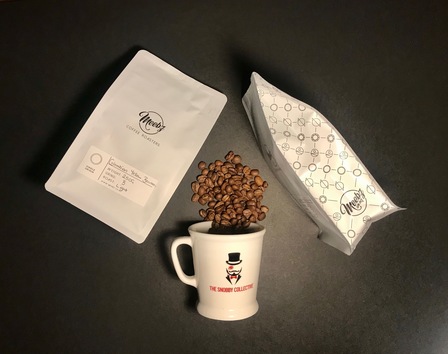February 2020
Feature #15
We first spoke to Mike from Meebz Coffee Roasters back in January 2019 and from the first conversation it was apparent that our collaboration was going to be worth the wait. With a planned trip to origin (this time Colombia) with the team from Cofinet on the horizon, we knew that we would be treated to not just tasty coffee for our collaboration, but a genuine connection and enthusiasm for what was presented. We weren't disappointed.
For February, www.meebz.co.nz presented wih a variety of options, including an extended fermentation (washed) Colombian Yellow Bourbon, which we chose to feature and share its story;
The Helping Hand:
The old saying goes, “you’ve got to spend money to make money.”This works if you first have the money, unfortunately this is not the reality for many producers. What if there was another way? Enter Cofinet, a fourth generation family owned Colombian coffee producer and exporter with 80 years of experience. Cofinet have been working with producers to achieve better coffee prices with little to no investment by the farmer. Cofinet specialise in alternative fermentation processes, such as the extended fermentation used for this Yellow Bourbon. Extending fermentation times during processing, result in unique cup profiles with the aim of improving cup scores of their coffees. Higher cup scores in turn result in higher premiums paid to farmers for their coffee. Given that most coffee farms have very limited resources, Cofinet have worked to create protocols that require minimal equipment or utilise items typically available at the farm. Great success has been found with producers fermenting cherries in the bags in which they are placed when picked. The process generates a form of anaerobic fermentation by sealing the cherries in the picking bags. After the desired time, the cherries are then pulped and further fermented. Technically the result is still a washed processed coffee, but with increased cup complexity
The Producer:
For twenty years Rafael has grown coffee, however he only made the transition to specialty coffee in 2015, after enrolling in SENA (coffee school) in 2014 to learn more about producing specialty coffee to enable him to produce high quality lots. After 12 months Rafael began to experiment with fermentation of his cherries, pushing out to 40 hours. (Typically Colombian coffee is fermented for 14-16 hours). Continued pushing of boundaries has led to extremely fruity and complex cup profiles and some of his recent coffees being subject to fermentation of 130-180 hours. Rafael determines when the fermentation is complete by sampling the mucilage. He explains, “when it tastes like over ripe orange its time to stop, this usually happens about 20 hours after it tastes like Passion fruit. This micro lot is 100% Yellow Bourbon, it represents the first lot produced by Rafael’s trees after being planted three years agoas a result of his realisitaion that he needed to sell more of his coffee into the specialty market as a result of the continued price decline of commodity coffee in Colombia. Unfortunately this issue is not isolated to Colombia. This micro lot underwent 50 hours of fermentation with the pulp on, followed by a further 50 hours after pulping. Processing was completed with a gently washing before being dried on raised beds.
The Variety:
Yellow Bourbon, a sub variety of Bourbon is a natural cross of Red Bourbon and Yellow Typica as its commonly known. First discovered in Brazil around 90 years ago, its journey began long before with the introduction of Typica in the 1720’s and Red Bourbon some 150 years later. At approximately the same time the yellow mutation of Typica was discovered in Sao Paulo. Yellow Bourbon caught the interest of researchers from AIC (Argonomic Institute of Campinas) the resulting study saw 30 lineages planted and studied between 1942-1945. During the 1950’s the most promising varieties were given the code “IAC” and made available to farmers. In 1951 a study of yields of available varieties (including Typica, Sumatra, Red bourbon, Maragogipe), Yellow Bourbon proved the most productive. In 2005 IAC again turned it’s attention to Yellow Bourbon. Focused on cup quality, 15 of the original 30 trees, with cup scores above 85 (out of 100) were selected. Currently 7 strains are registered with the Ministry of Agriculture. Compared to varietals available today, Yellow Bourbons’ low - medium yields and susceptibility to leaf rust mean it requires more attention and care, but boasts cup quality potential when grown at 1000+ M.A.S.L in conjunction with quality processing. In 2017 a Brazil Yellow Bourbon won a cup of excellence competition and subsequently sold at auction as the most expensive coffee in the world (at that time). 100x the C price. (C price refers to the global commodity coffee price of Arabica)
Tasting Notes:
Country: Colombia
Department: Huila
Municapality: Timana
Farm: Finca LA Montana
Producer: Rafael Amaya
M.A.S.L 1700-1800
Temperature: 16-24 Deg. C
Rainfall: 1700-2000mm
Varietal: Yellow Bourbon
Process: Washed – Extended fermentation
Flavour notes: Guava, Orange, Cacao
Click here for another yellow variety that originated in Brazil and has garnered the interest of IAC.
Recipe:
Recommended method: Pour Over
Device: V60
Dose: 15g for 01 (single cup).
Water Temp: 93 degrees Celsius
Bloom: 50g
Followed by the remainder 175g hot water Total of 225g
|
© Copyright Derelict Coffee Roasters |

